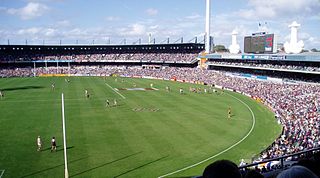
The Australian Capital Territory, formerly known as the Federal Capital Territory until 1938 and commonly referred to as the ACT, is a federal territory of Australia containing the Australian capital city of Canberra and some surrounding townships. It is located in the south-east of the country and enclaved within the state of New South Wales. Founded after federation as the seat of government for the new nation, all important institutions of the Australian federal government are centred in the Territory.

Canberra is the capital city of Australia. With a population of 410,301, it is Australia's largest inland city and the eighth-largest city overall. The city is located at the northern end of the Australian Capital Territory, 280 km (170 mi) south-west of Sydney, and 660 km (410 mi) north-east of Melbourne. A resident of Canberra is known as a Canberran. Although Canberra is the capital and seat of government, many federal government ministries have secondary seats in state capital cities, as do the Governor-General and the Prime Minister.

The Legislative Assembly for the Australian Capital Territory is the unicameral legislature of the Australian Capital Territory (ACT). It sits in the Legislative Assembly Building on Civic Square, close to the centre of the city of Canberra.

Mount Ainslie is a hill with an elevation of 843 metres (2,766 ft) AHD that is located in the northeastern suburbs of Canberra, in the Australian Capital Territory, Australia. Mount Ainslie lies within part of the Canberra Nature Park.

The District of Tuggeranong is one of the original eighteen districts of the Australian Capital Territory used in land administration. The district is subdivided into divisions (suburbs), sections and blocks and is the southernmost town centre of Canberra, the capital city of Australia. The district comprises nineteen suburbs and occupies 117 square kilometres (45 sq mi) to the east of the Murrumbidgee River.

In Australia, electoral districts for the Australian House of Representatives are called divisions or more commonly referred to as electorates or seats. There are currently 150 single-member electorates for the Australian House of Representatives.
Gregory Charles Dyer is a former New South Wales and Australian wicketkeeper. Dyer played in six Tests and 23 ODIs from 1986 to 1988, including playing in the victorious 1987 World Cup Final. He toured India in 1986 as a back-up keeper.

Australian rules football matches between teams representing Australian colonies, states and territories have been held since 1879. For most of the 20th century, the absence of a national club competition and international matches meant that football games between state representative teams were regarded with great importance. Football historian John Devaney has argued that: "some of the state of origin contests which took place during the 1980s constituted arguably the finest expositions of the game ever seen".
John Martin Armiger is an Australian musician, record producer and film/TV composer. He was singer-songwriter and guitarist with Melbourne-based rock band, The Sports from August 1978 to late 1981, which had Top 30 hits on the Kent Music Report Singles Chart with, "Don't Throw Stones" (1979), "Strangers on a Train" (1980) and "How Come" (1981); and Top 20 albums with, Don't Throw Stones, Suddenly and Sondra (1981).
Dimboola is a play by the Australian author Jack Hibberd. It premiered in 1969 at La Mama Theatre under the direction of Graeme Blundell. The whole action of the play supposedly takes place at a real wedding at which the actors represent the families of the bride and groom and the audience are "invited guests". The play is described in the program notes as Rabelaisian and rumbustious.
Timoshenko Aslanides is an Australian poet.
The 1988 Adelaide Bicentennial Carnival was the 22nd edition of the Australian National Football Carnival, an Australian rules football State of Origin competition. Australia was celebrating its Bicentenary in 1988 so the carnival was known as the 'Bicentennial Carnival'. It took place over four days from 2 March until 5 March, and the matches were played at Football Park and Norwood Oval.

The 1979 Perth State of Origin Carnival was the 20th Australian National Football Carnival, an Australian rules football competition. It was the first carnival to take place under the State of Origin format.
A Toast to Melba is a 1976 Australian play by Jack Hibberd. It was written in 1975. Hibberd described it as:
Another 'Popular Play' like The Les Darcy Show. Using the Epic Theatre techniques of Bertolt Brecht, the play encompasses the life of diva Nellie Melba from childhood in Melbourne to her death in Egypt ... The actress who plays Melba must be able to sing a few arias and parlour songs. There is a selection of recorded music that is essential to the work.

St Paul's Church is an Anglican church in the suburb of Griffith in Canberra, Australia. Founded in 1939, it is part of the Anglican Diocese of Canberra and Goulburn. It is listed in the Australian Capital Territory Heritage Register as an "...excellent example of an Inter-War Gothic church with Art Deco influences". It was the first place in Australia to install a combination organ and has the only peal of bells in the Australian Capital Territory. It was the first Anglican church to be built following the foundation of Canberra as the national capital and is the first Anglican parish in South Canberra. It is situated on the corner of Canberra Avenue and Captain Cook Crescent, opposite Manuka Oval and the Manuka shops.
Once In A Blue Moon: A Celebration of Australian Musicals is a 1994 television special featuring songs from Australian musicals from the 1950s to the 1990s.
The Victorian Premier's Prize for Drama is a prize category in the annual Victorian Premier's Literary Awards. The winner of this category prize vies with four other category winners for overall Victorian Prize for Literature.












